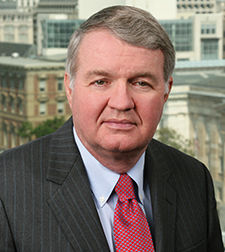
From the moment he descended the Trump
Tower escalator to announce his candidacy for U.S. president, Donald Trump has
defied predictions. Nailing down what President Trump will mean for
transportation issues is no less difficult, but former Secretary of
Transportation James Burnley offered BTN some insight.
Air traffic control structure: House Transportation
& Infrastructure Committee Chairman Bill Shuster's proposal to spin off air
traffic control into a nonprofit entity separate from the Federal Aviation
Administration failed in the Senate last year, but Shuster has indicated he
plans to try again. Whether he succeeds, Burnley said, likely will be
determined by the level of support he receives from Elaine Chao, Trump's pick
for secretary of transportation. "In my experience in the Reagan years,
when we privatized Conrail, it took us three years, and it took
secretarial-level attention," he said. "With [then-Secretary of
Transportation] Elizabeth Dole, the two of us worked on that every day.
Secretarial leadership and engagement on these issues are very important, and I
hope we see that."
Infrastructure: Trump promised $1 trillion in
infrastructure investments, so Burnley will be surprised if it isn't a focus of
Trump's domestic policy. "In the context of the debate about tax reform in
particular, there may be some serious discussion about infrastructure opportunities
the federal government can encourage," Burnley said. "I know of no
scenario that we'd have a stimulus-style bill a la 2009, but [we could see]
freeing up capital in the private sector in various ways. Whether that is in
the form of an infrastructure bank that a Trump administration can support, we'll
see." Burnley also said, "One area we might see a focus on is
accelerating the delivery of projects. It would not surprise me if [Trump]
embraced a proposal or proposals to try to very substantially accelerate
federal reviews of major infrastructure projects."
Open Skies: "For
countries with restrictive bilateral agreements, there's been an emphasis on
trying to move to Open Skies," Burnley said. "If you take the
president-elect at his word on these matters, you're going to see the U.S.
negotiating position perhaps be a bit stronger in terms of representing U.S.
interests." Meanwhile, a coalition of major U.S. carriers and labor groups
has been urging the government to revisit Open Skies agreements with Qatar and
United Arab Emirates based on allegations that the three Gulf carriers get an
unfair advantage from government subsidies; the Gulf carriers deny that. "There
hasn't been a lot of overt activity from the Obama administration on that
front," Burnley said. "It's too early to predict with any confidence
what a new administration would do, but I would hope that is at the top of the
list of issues for the new secretary of transportation and new secretary of
state."